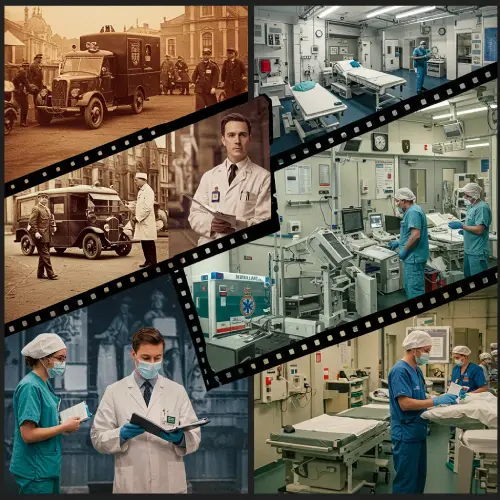Emergency medicine is a vital and rapidly evolving field, central to providing urgent, life-saving care. In the UK, the evolution of emergency medicine has been significantly influenced by the Royal College of Emergency Medicine (RCEM), a professional body dedicated to advancing the specialty, setting standards, and ensuring the highest quality of care for patients in emergency departments across the country.
In this blog, we’ll explore the evolution of emergency medicine in the UK and how RCEM has played an instrumental role in shaping its development.
A Brief History of Emergency Medicine in the UK
Emergency medicine, as a formal medical specialty, is a relatively recent development in the history of medicine. Prior to the 20th century, patients with urgent medical needs were often treated in makeshift settings or through general practitioners who provided care in a variety of specialties.
It wasn’t until the late 20th century that emergency departments (EDs) became a core feature of the healthcare system in the UK. This shift was due to the increasing complexity of medical cases and the rising demand for specialized care for acute and emergency conditions.
In 1967, the Royal College of Surgeons first acknowledged emergency medicine as a distinct specialty. However, it wasn’t until the 1990s that the Royal College of Emergency Medicine (RCEM) was formally established to advocate for emergency medicine as an independent field and develop the standards, education, and training programs that exist today.
The Role of RCEM in Shaping Emergency Medicine
The creation of RCEM marked a turning point in the development of emergency medicine in the UK. Its primary goal was to advance the quality of emergency care and to ensure that emergency department staff were trained and supported in a way that was consistent with the highest standards of clinical practice.
Here’s how RCEM has shaped the evolution of emergency medicine:
- Establishing National Standards of Care
One of RCEM’s most significant contributions has been in setting national standards of care for emergency medicine. By creating comprehensive clinical guidelines, RCEM has ensured that healthcare professionals across the UK follow evidence-based best practices. These guidelines cover a wide range of conditions, from trauma and cardiac emergencies to pediatric care and stroke management.
Through initiatives like the RCEM Clinical Standards, the College ensures that emergency departments maintain consistent quality and that patients receive high standards of care regardless of where they are treated. This has been critical in improving patient outcomes and ensuring that emergency departments operate efficiently and effectively.
- Advancing Education and Training in Emergency Medicine
RCEM has played a crucial role in the establishment of structured educational pathways for emergency medicine professionals. The introduction of formal exams and training programs, such as the FRCEM (Fellowship of the Royal College of Emergency Medicine), has created a clear career development path for medical professionals in the field.
Before RCEM’s influence, emergency medicine was largely seen as an ancillary part of other specialties. However, RCEM has been a key driver in establishing emergency medicine as a distinct and respected specialty in its own right. Through its comprehensive training programs, RCEM ensures that emergency medicine professionals receive the necessary skills and knowledge to handle complex, high-pressure situations effectively.
- Improving Workforce Conditions and Advocacy
RCEM has long been an advocate for the well-being and fair treatment of emergency medicine professionals. The demands of working in emergency care are high, with long hours, stressful situations, and often, resource shortages. RCEM has been instrumental in lobbying for improvements in working conditions, such as fair pay, better working hours, and sufficient resources to manage increasing patient volumes.
Additionally, RCEM continues to highlight the issue of workforce shortages in emergency medicine and pushes for increased recruitment and retention of skilled professionals. By advocating for policies that prioritize emergency care, RCEM has played a pivotal role in improving both the workplace environment for staff and the level of care patients receive.
- Research and Innovation in Emergency Medicine
Research has always been at the core of RCEM’s mission. As emergency medicine continues to evolve, RCEM has supported and facilitated research into better patient outcomes, more efficient emergency care, and innovative medical technologies. The College’s Emergency Medicine Journal (EMJ) has become an influential platform for disseminating research, clinical trials, and case studies, helping to further enhance the field.
In recent years, RCEM has also focused on research related to patient safety, reducing wait times in emergency departments, and improving response times for critical care. By supporting evidence-based innovation, RCEM has contributed to better practices and solutions to complex challenges within emergency care.
- Responding to Emerging Challenges
The landscape of emergency medicine is constantly changing, with new challenges arising, such as the increasing pressure on emergency departments due to aging populations, pandemics like COVID-19, and the rising complexity of medical cases. RCEM’s ability to respond to these challenges has been key in keeping emergency care effective and adaptable.
During the COVID-19 pandemic, RCEM played a critical role in guiding the emergency medicine community, providing resources, and ensuring that emergency departments were well-equipped to handle the surge in patient numbers. The College’s swift response to this crisis exemplifies its ongoing commitment to adapting to the changing needs of healthcare.
The Future of Emergency Medicine and RCEM’s Continuing Impact
The future of emergency medicine is promising, yet it is not without challenges. With the growing demands on emergency departments and the rapid pace of medical advancements, RCEM’s role will continue to be essential in shaping the direction of the specialty. Key areas for future development include:
- Integration of technology in the diagnosis and treatment of emergency patients, from artificial intelligence to telemedicine.
- Mental health care in emergency medicine, with a rising need to provide more comprehensive mental health support for patients in crisis.
- Workforce sustainability to address the increasing strain on emergency departments and maintain a skilled, supported workforce.
RCEM will continue to lead the charge in these areas, ensuring that emergency medicine remains a dynamic, innovative, and patient-centered specialty. As the healthcare landscape evolves, RCEM will remain a crucial force in shaping the future of emergency care in the UK.
Conclusion
The evolution of emergency medicine in the UK is a testament to the dedication and hard work of the Royal College of Emergency Medicine. Through its focus on setting standards, advancing education, advocating for workforce improvements, and embracing research and innovation, RCEM has played an essential role in shaping emergency care as we know it today.
As we look to the future, RCEM’s continued leadership will be vital in ensuring that emergency medicine keeps pace with new challenges, technologies, and opportunities, ultimately improving the quality of care for patients in their most urgent moments of need.




